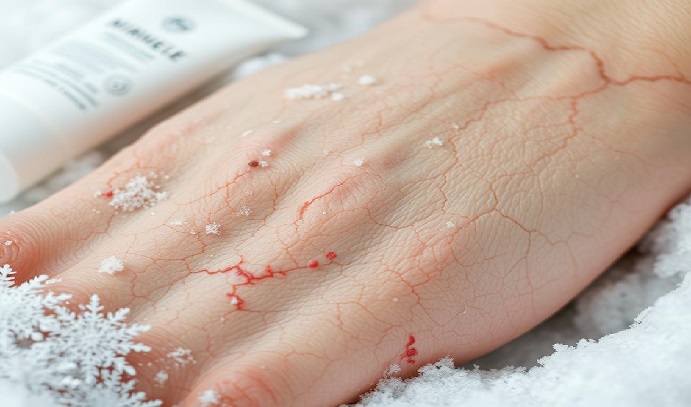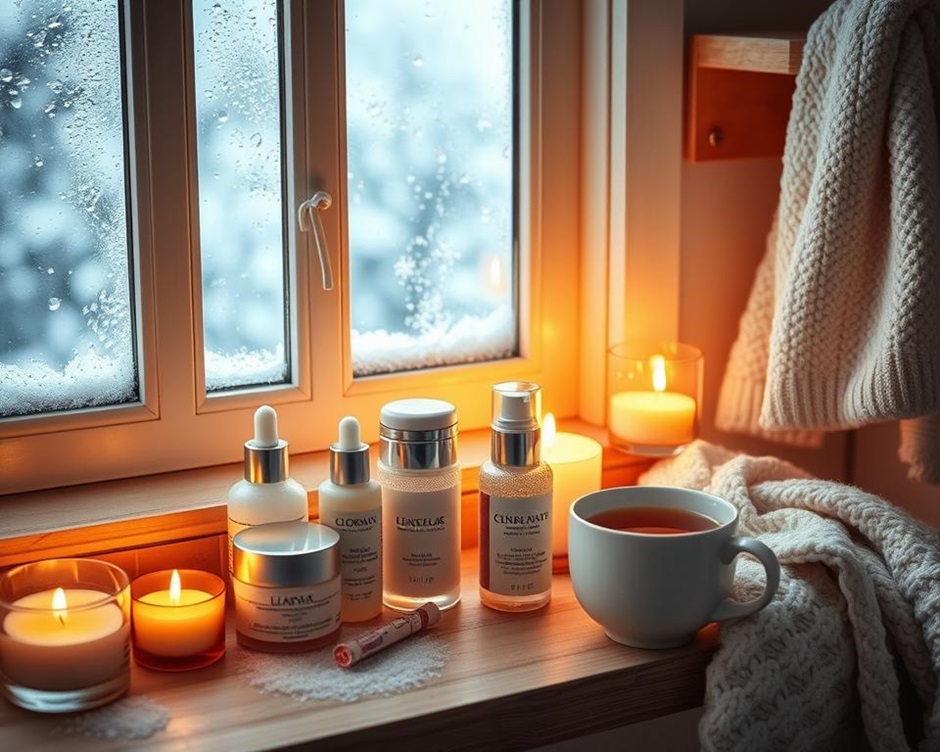Dermatologists Reveal 9 Essential Winter Skincare Tips for Glowing Skin
Winter winds can make your skin dry and irritated. The cold air, low humidity, and indoor heat all take a toll. But you can fight back with the right skincare routine.
We’ve gathered top tips from dermatologists for winter skin care. These strategies will help you keep your skin healthy and glowing all season.
A serene winter scene featuring a cozy bathroom with a soft glow, adorned with skincare products like moisturizers, serums, and lip balms on a wooden shelf. A frosty window shows snowflakes outside, while warm candlelight reflects off the surfaces. A plush towel hangs nearby, and a steaming cup of herbal tea rests beside the skincare items, evoking a sense of comfort and self-care during the winter season.
Key Takeaways
- Adjust your skincare routine to combat the drying effects of winter weather and indoor heating.
- Opt for gentle, hydrating cleansers and moisturizers formulated with nourishing ingredients.
- Protect your skin from the sun’s rays, even in the colder months, by using SPF 30 or higher.
- Manage your indoor environment by maintaining optimal humidity levels and avoiding excessive heating.
- Incorporate winter-friendly skincare products and practices to keep your skin healthy and glowing.
Understanding Winter’s Impact on Skin Health
Winter can harm your skin’s health. The cold air makes your skin lose moisture. This makes your skin dry and tight.
It also makes your skin more likely to get irritated.
Common Winter Skin Conditions
Winter can make skin problems worse. These include:
- Eczema – Dry air can make eczema worse, causing redness and itchiness.
- Psoriasis – Cold air can make psoriasis symptoms worse, leading to scaly patches.
- Rosacea – Cold winds can make rosacea symptoms worse, causing redness and irritation.
- Keratosis Pilaris – This condition can get worse in winter because of dry air.
- Raynaud’s Disease – This condition makes fingers and toes very sensitive to cold, causing pain.
The Role of Indoor Heating
Indoor heating keeps us warm but harms our skin. It dries out the air, making our skin lose moisture. This weakens our skin barrier and increases the risk of dryness and irritation.
Knowing how cold weather and indoor heating affect our skin is key. It helps us keep our skin healthy and glowing during winter.

A close-up of dry, cracked winter skin with visible flakes and redness, surrounded by a soft, snowy landscape, gentle frost patterns on the surface, a soothing moisturizer nearby, with a muted color palette emphasizing the cold atmosphere.
The Importance of Proper Cleansing and Moisturizing in Winter
Winter can be tough on your skin. The cold air makes it dry. Dermatologists see more people with dry skin in winter. It’s key to clean and moisturize your skin right.
Choose hydrating cleansers instead of harsh face washes. They keep your skin’s natural oils. Use cream or lotion-based cleansers to avoid dryness. Then, apply a thick, creamy moisturizer to keep moisture in.
Look for moisturizers with ceramides, hyaluronic acid, and petrolatum. They strengthen your skin and keep it moist. Apply moisturizer when your skin is still damp.
Shorten your shower time and use lukewarm water. Hot water dries out your skin. A humidifier helps keep your skin moist in dry air.
| Skin Condition | Prevalence | Tips for Management |
| Eczema | Affects over 31 million Americans | Use a gentle, fragrance-free moisturizer to soothe and hydrate the skin. |
| Psoriasis | Affects individuals with red, itchy scaly patches on the skin, common during winter | Consult a dermatologist for prescription treatments and moisturizing recommendations. |
| Rosacea | Can lead to permanent skin and eye damage | Avoid irritants, use a daily sunscreen, and opt for gentle, calming skincare products. |
| Keratosis Pilaris | Known as “Chicken Skin,” causes dry, rough patches and tiny bumps on the skin | Exfoliate regularly and use a thick, creamy moisturizer to smooth the skin’s texture. |
Follow these winter cleansing and moisturizing tips to keep your skin healthy. If your skin problems don’t get better, see a dermatologist.

A serene winter scene featuring a cozy bathroom with snow gently falling outside the window, a wooden sink adorned with luxurious skincare products like creams, serums, and oils, soft candlelight illuminating the space, and a plush towel draped over a heated rack, conveying a sense of warmth and self-care amidst the cold.
Smart Product Swaps for Winter Skincare
As the weather gets colder, it’s time to change your skincare products. Harsh winds, low humidity, and indoor heat can dry out your skin. To fight these changes, you need to switch to winter skincare products.
Choosing the Right Moisturizer
Finding the right moisturizer is key in winter. Look for creams and ointments with dimethicone, glycerin, hyaluronic acid, jojoba oil, lanolin, and shea butter. These ingredients deeply moisturize and protect your skin.
Gentle Cleansers for Winter
Stay away from harsh cleansers in winter. Instead, use gentle, hydrating formulas. Look for cleansers with a pH of 4-5 to keep your skin’s natural oils. Try CeraVe Hydrating Facial Cleanser, Neutrogena Fragrance-Free Ultra Gentle Cleanser, or La Roche-Posay Toleriane Hydrating Gentle Cleanser.
Essential Ingredients to Look For
When buying winter skincare, look for these key ingredients:
- Ceramides – They fix the skin’s barrier.
- Peptides – They boost collagen for younger skin.
- Hyaluronic Acid – It keeps your skin moist and plump.
- Glycerin – It keeps your skin’s moisture balance.
By making these winter skincare product changes, you can avoid dryness and irritation. Your skin will stay healthy, glowing, and protected.
Winter Skin Care Routine for Dry Skin: 9 Essential Tips from Dermatologists for Healthy Skin
When it gets colder and the air gets drier, your skin faces many challenges. Luckily, dermatologists have shared their best tips for healthy skin in winter. By following these dermatologist skincare tips, you can avoid dry skin and keep your skin looking great all winter.
- Use gentle, hydrating cleansers to avoid stripping your skin’s natural oils.
- Apply thicker moisturizers to lock in moisture and prevent winter skin care routine dryness.
- Don’t skip sunscreen – UV rays can still damage skin, even in cold weather.
- Limit hot showers and baths to prevent further drying of the skin.
- Use a humidifier to add moisture back into the dry indoor air.
- Protect your hands and feet with gloves and socks to prevent chapping.
- Apply lip balm regularly to keep your lips soft and hydrated.
- Stay hydrated by drinking plenty of water throughout the day.
- Adjust your use of active ingredients like retinoids and exfoliants to avoid over-drying your skin.
By adding these dermatologist skincare tips to your winter skin care routine, you can fight dry skin prevention and keep your skin healthy in winter.
Protection and Prevention Strategies
As winter comes, it’s key to protect your skin from harsh elements. Use winter sun protection and protective clothing and accessories. These steps help keep your skin healthy and glowing all season.
Sunscreen Usage in Winter
Sunscreen is as important in winter as in summer. UV rays can get through clouds and snow, harming your skin. Dermatologists say to use a broad-spectrum sunscreen with SPF 30 or higher every day.
Even on cloudy or snowy days, apply sunscreen. For best protection, reapply every two hours when outside.
Protective Clothing and Accessories
Protect your skin from cold, wind, and harsh winter. Wear protective clothing like gloves, hats, and scarves. Choose wool, cashmere, and natural fibers for warmth without skin irritation.
Managing Indoor Environment
Home’s dry, heated air can harm your skin in winter. Use a humidifier to keep humidity between 30% and 50%. Avoid sitting near heat sources like fireplaces to prevent dryness.
Drink lots of water to keep your skin moist. This helps your skin’s natural moisture barrier.
By following these winter skin damage prevention tips, you can protect your skin. Enjoy the season with confidence.
Common Winter Skincare Mistakes to Avoid
When it gets colder and the air gets drier, take care of your skin. Avoiding common mistakes can keep your skin healthy and glowing. Here are some pitfalls to avoid:
- Overexfoliating: Dermatologist Marianna Blyumin-Karasik, MD, says too much exfoliating can cause redness and itching. Use gentle exfoliants to nourish your skin.
- Using harsh products: Avoid products with alcohol or strong fragrances. They can dry out and irritate your skin. Choose gentle, hydrating products instead.
- Taking hot showers: Dermatologist Linda C. Honet warns that hot showers can remove your skin’s natural oils. Use lukewarm water and keep showers short.
- Neglecting lips and hands: Protect your lips and hands from the cold. Use nourishing balms and creams to keep them moisturized and prevent chapping.
- Forgetting sunscreen: Dermatologists Lesley Clark-Loeser and Deborah Longwill say don’t skip sunscreen, even in the cold. Use broad-spectrum sunscreen to protect your skin from UV damage.
By avoiding these winter skincare mistakes, you can keep your skin healthy and glowing all season.
| Mistake | Expert Advice |
| Overexfoliating | Use gentle, nourishing exfoliants to avoid irritation. |
| Using harsh products | Opt for gentle, hydrating cleansers and moisturizers. |
| Taking hot showers | Stick to lukewarm water and limit shower time. |
| Neglecting lips and hands | Use nourishing balms and creams to keep them hydrated. |
| Forgetting sunscreen | Use broad-spectrum sunscreen year-round to protect against UV damage. |
By addressing these common winter skincare errors, you can keep your skin healthy, hydrated, and glowing all season long.
Frequently Asked Questions
Q: What are the best winter skincare tips to care for my skin?
A: To keep your skin healthy during the winter months, focus on moisturizing regularly, using gentle cleansers, and applying sunscreen even on cloudy days. These skin care tips will help protect your skin and prevent common winter skin issues.
Q: How can I treat dry winter skin effectively?
A: To treat dry winter skin, incorporate hydrating skin care products into your routine, such as thick creams or oils that lock in moisture. Additionally, consider using a humidifier at home to keep the air from stripping your skin of its natural moisture.
Q: What should I include in my winter skincare routine for sensitive skin?
A: For sensitive skin, it’s essential to choose pure, fragrance-free skin care products that hydrate without causing irritation. Look for ingredients like ceramides and hyaluronic acid to keep your skin nourished and protected from the harsh winter elements.
Q: How does winter affect your skin and what are common skin issues?
A: Winter can wreak havoc on your skin, leading to dryness, flakiness, and itchy skin. The cold air and indoor heating can strip away the skin of its natural oils, making it essential to adjust your skincare routine to combat common winter skin issues.
Q: What are some effective homemade remedies for winter skin care?
A: Homemade remedies like coconut oil or aloe vera can be great for winter skin care. These natural ingredients help to moisturize and protect your skin without harsh chemicals, making them perfect for maintaining healthy skin during the winter months.
Q: How can I keep my skin hydrated in winter?
A: To keep your skin hydrated in winter, drink plenty of water, use a rich moisturizer daily, and apply products immediately after bathing to lock in moisture. This will help keep your skin glowing and prevent it from feeling dry.
Q: What skin care products should I avoid during the winter?
A: Avoid skin care products that contain alcohol or harsh exfoliants, as they can further dry out your skin. Instead, focus on gentle cleansers and heavy moisturizers that provide a protective barrier against winter’s harsh conditions.
Q: Why is it important to adjust my skin care regimen in winter?
A: Adjusting your skin care regimen in winter is crucial because your skin’s needs change with the seasons. By using heavier creams and targeted skin treatments, you can combat winter dryness and maintain the skin of its natural glow.
Q: How often should I exfoliate during the winter?
A: Exfoliating once a week is generally enough during the winter to remove dead skin cells without damaging your skin. This helps keep your skin smooth and allows better absorption of moisturizers, but be cautious not to over-exfoliate, especially with delicate skin types.
Q: What is the best way to protect your skin from the cold?
A: To protect your skin from the cold, wear protective clothing, use a strong moisturizer, and apply sunscreen before heading outdoors. These simple steps can help shield your skin from damage and keep it looking healthy throughout the winter.
Conclusion
Winter is coming, and your skin needs a change in routine. Cold weather affects your skin, but you can keep it healthy and glowing. Just know the right steps to take.
Dermatologists say to use gentle cleansers and lots of moisturizer. Also, protect your skin from the cold and wind. It might take time for your skin to heal, so be patient. If you have special skin issues, see a dermatologist for help.
With the right homemade remedies for glowing skin in winter, your skin will stay nourished and strong. Follow dermatologist advice for seasonal skincare adjustments and healthy skin maintenance. This way, your skin will shine, even when it’s cold.
For a variety of content focused on natural and herbal remedies for various healthcare concerns, please visit: Pure Remedy Solutions


